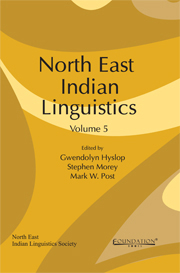Book contents
- Frontmatter
- Contents
- About the Contributors
- Foreword
- A Note from the Editors
- Contact and genetic linguistics
- Historical-comparative Tibeto-Burman grammar
- The North East Indian noun phrase
- 7 The marking of noun phrases: Some observations on the languages of North East India
- 8 Deverbal nominals in Sumi
- Assamese grammar
- Advances in Boro-Garo phonology
- Poetics and text
7 - The marking of noun phrases: Some observations on the languages of North East India
from The North East Indian noun phrase
Published online by Cambridge University Press: 05 September 2013
- Frontmatter
- Contents
- About the Contributors
- Foreword
- A Note from the Editors
- Contact and genetic linguistics
- Historical-comparative Tibeto-Burman grammar
- The North East Indian noun phrase
- 7 The marking of noun phrases: Some observations on the languages of North East India
- 8 Deverbal nominals in Sumi
- Assamese grammar
- Advances in Boro-Garo phonology
- Poetics and text
Summary
Introduction
Grammatical descriptions of languages spoken in North East India often rely on the classification and terminology used for the classical Indo-European languages, particularly Latin and Sanskrit. Thus one often reads about ‘Nominative’, ‘Accusative’, ‘Dative’ and so on, regarding languages as widely divergent as those of the Tibeto-Burman, Indo-Aryan and Tai families. While these terms should of course be used when they are appropriate, we suggest that for some languages of the North East they are not, and that more semantically based terms like ‘agentive’ and ‘antiagentive’ should be used.
One of the features of the Latin and Sanskrit systems is that they are systematic: every noun must be marked by one or other of these cases. Words that modify the noun, like adjectives and demonstratives, also get marked. Pronouns are also marked for case, though the form of the marking may differ. At least some of these markers are clearly syntactic in nature: for example, the normative case is used to mark the subject of a sentence. These systems form paradigms that are learned by students as the declensions of Latin and Sanskrit.
- Type
- Chapter
- Information
- North East Indian Linguistics , pp. 171 - 191Publisher: Foundation BooksPrint publication year: 2013



